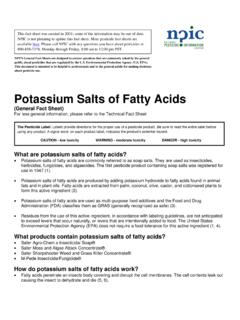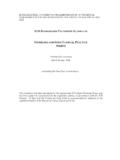Transcription of Thymoglobulin (anti-thymocyte globulin [rabbit]) - …
1 Thymoglobulin (Anti-thymocyte globulin [Rabbit]) Product Monograph Page 1 of 32 PRODUCT MONOGRAPH PrTHYMOGLOBULIN (Anti-thymocyte globulin [Rabbit]) Powder for Solution Standard: Professed Immunosuppressant sanofi-aventis Canada Inc. 2905 Place Laval, Quebec H7V 0A3 Date of Revision: March 7, 2016 Date of Approval: March 30, 2016 Submission Control No: 191982 s-a Version dated March 7, 2016 Thymoglobulin (Anti-thymocyte globulin [Rabbit]) Product Monograph Page 2 of 32 Table of Contents PART I: HEALTH PROFESSIONAL INFORMATION ..3 SUMMARY PRODUCT INFORMATION ..3 INDICATIONS AND CLINICAL USE ..3 CONTRAINDICATIONS ..3 WARNINGS AND PRECAUTIONS ..4 ADVERSE REACTIONS ..7 DRUG INTERACTIONS ..13 DOSAGE AND ADMINISTRATION ..14 OVERDOSAGE ..16 ACTION AND CLINICAL PHARMACOLOGY ..16 STORAGE AND STABILITY.
2 18 DOSAGE FORMS, COMPOSITION AND PACKAGING ..18 PART II: SCIENTIFIC INFORMATION ..20 PHARMACEUTICAL INFORMATION ..20 CLINICAL TRIALS ..21 DETAILED PHARMACOLOGY ..23 TOXICOLOGY ..26 REFERENCES ..27 PART III: CONSUMER Thymoglobulin (Anti-thymocyte globulin [Rabbit]) Product Monograph Page 3 of 32 PrTHYMOGLOBULIN (Anti-thymocyte globulin [Rabbit]) PART I: HEALTH PROFESSIONAL INFORMATION SUMMARY PRODUCT INFORMATION Route of Administration Dosage Form / Strength Clinically Relevant Nonmedicinal Ingredients Intravenous infusion Lyophilized powder Thymoglobulin formulation 25mg Glycine, Sodium Chloride, D-Mannitol For a complete listing see Dosage Forms, Composition and Packaging section. DESCRIPTION Thymoglobulin (Anti-thymocyte globulin [rabbit]) is a purified, pasteurized, gamma immune globulin obtained by immunization of rabbits with human thymocytes. Gamma immune globulin or Immunoglobulins are heavy plasma proteins, often with added sugar chains on N-terminal.
3 INDICATIONS AND CLINICAL USE Thymoglobulin (Anti-thymocyte globulin [Rabbit]) is indicated for the treatment of renal transplant acute rejection in conjunction with concomitant immunosuppression and for induction in adult renal transplant recipients. CONTRAINDICATIONS Thymoglobulin (Anti-thymocyte globulin [Rabbit]) is contraindicated in patients with: Hypersensitivity to rabbit proteins or to any product excipients Active acute or chronic infections, which would contraindicate any additional immunosuppression Thymoglobulin (Anti-thymocyte globulin [Rabbit]) Product Monograph Page 4 of 32 WARNINGS AND PRECAUTIONS Serious Warnings and Precautions Thymoglobulin (Anti-thymocyte globulin [Rabbit]) should only be used by physicians experienced in immunosuppressive therapy for the treatment of renal transplant patients. In rare instances, serious immune-mediated reactions have been reported with the use of Thymoglobulin and consist of anaphylaxis or severe cytokine release syndrome (CRS).
4 (see Immune) Medical surveillance is required during Thymoglobulin infusion. General Appropriate dosing for Thymoglobulin is different from dosing for other anti-thymocyte globulin (ATG) products, as protein composition and concentrations vary depending on the source of ATG used. Physicians should therefore exercise care to ensure that the dose prescribed is appropriate for the ATG product being administered . Thymoglobulin should be used under strict medical supervision in a hospital setting, and patients should be carefully monitored during the infusions. Infusion-associated reactions (IARs) including oxygen desaturation may occur during or following the administration of Thymoglobulin and may occur as soon as the first or second infusion during a single course of Thymoglobulin treatment. Close compliance with the recommended dosage and infusion time may reduce the incidence and severity of IARs. Additionally, reducing the infusion rate may minimize many of these acute IARs.
5 Premedication with antipyretics, corticosteroids, and/or antihistamines may decrease both the incidence and severity of these adverse reactions. Rapid infusion rates have been associated with case reports consistent with CRS. In rare instances, severe CRS can be fatal. (See Immune) Immune In rare instances, serious immune-mediated reactions have been reported with the use of Thymoglobulin and consist of anaphylaxis or severe cytokine release syndrome (CRS). Very rarely, fatal anaphylaxis has been reported (See Adverse Events from Post-Marketing Experience). If an anaphylactic reaction occurs, the infusion should be terminated immediately. Medical personnel should be available to treat patients who experience anaphylaxis. Emergency treatment such as mL to mL aqueous epinephrine (1:1000 dilution) subcutaneously and other resuscitative measures including oxygen, intravenous fluids, antihistamines, corticosteroids, pressor amines, and airway management, as clinically indicated, should be Thymoglobulin (Anti-thymocyte globulin [Rabbit]) Product Monograph Page 5 of 32 provided.
6 Thymoglobulin or other rabbit immunoglobulins should not be administered again for such patients. Severe, acute infusion-associated reactions (IARs) are consistent with CRS attributed to the release of cytokines by activated monocytes and lymphocytes. In rare instances, these reported reactions are associated with serious cardiorespiratory events and/or death (See Post-market Adverse Drug Reactions). Thymoglobulin contains a mixture primarily of antibodies to T cell antigens, but it is largely unknown which specificities mediate the alteration in immunoregulation. Thymoglobulin may potentially contain or promote undesired or harmful antibody specificities, but which may be difficult to predict, identify or to exclude. Live vaccines should not be administered to patients about to receive, receiving, or after treatment with Thymoglobulin . Concomitant administration of Thymoglobulin with live virus vaccines carries a potential of uncontrolled viral replication in the immunosuppressed patient.
7 There is insufficient information to fully define the extent of the risk, or the period of time during which the risk exists. If administered , live viruses may interfere with Thymoglobulin treatment. Skin testing is not advised prior to Thymoglobulin administration. Infection Thymoglobulin is routinely used in combination with other immunosuppressive agents. Infections (bacterial, fungal, viral, and protozoal), reactivation of infection (particularly cytomegalovirus [CMV]), and sepsis have been reported after Thymoglobulin administration in combination with multiple immunosuppressive agents. In rare cases, these infections have been fatal. Careful patient monitoring and appropriate anti-infective prophylaxis are recommended. Malignancy Use of immunosuppressive agents, including Thymoglobulin , may increase the incidence of malignancies, including lymphoma or post-transplant lymphoproliferative disease (PTLD) (See Post-market Adverse Drug Reactions).
8 A ppropriate antiviral, antibacterial, antiprotozoal, and/or antifungal prophylaxis is recommended. Carcinogenesis and Mutagenesis The carcinogenic and mutagenic potential of Thymoglobulin and its potential to impair fertility have not been studied. Special Considerations for Thymoglobulin Infusion As with any infusion, reactions at the infusion site can occur and may include pain, swelling, and erythema. Thymoglobulin (Anti-thymocyte globulin [Rabbit]) Product Monograph Page 6 of 32 The recommended route of administration for Thymoglobulin is intravenous infusion using a high flow vein; however, it may be administered through a peripheral vein. When Thymoglobulin is administered through a peripheral vein, concomitant use of heparin and hydrocortisone in an infusion solution of sodium chloride may minimize the potential for superficial thrombophlebitis and deep vein thrombosis.
9 The combination of Thymoglobulin , heparin, and hydrocortisone in a dextrose infusion solution has been noted to precipitate and is not recommended. Hematologic Effects Thrombocytopenia and/or leukopenia (including lymphopenia and neutropenia) have been identified and are reversible following dose adjustments. When thrombocytopenia and/or leukopenia are not part of the underlying disease or associated with the condition for which Thymoglobulin is being administered , the following dose reductions are suggested: A reduction in dosage must be considered if the platelet count is between 50,000 and 75,000 cells/mm3 or if the white blood cell count is between 2,000 and 3,000 cells/mm3; Stopping Thymoglobulin treatment should be considered if persistent and severe thrombocytopenia (< 50,000 cells/mm3) occurs or leukopenia (< 2,000 cells/mm3) develops. White blood cell and platelet counts should be monitored during and after Thymoglobulin therapy.
10 Occupational Hazards Effects on Ability to Drive and Handle Heavy Machinery Given the possible adverse events that can occur during the period of Thymoglobulin infusion, in particular CRS, it is recommended that patients should not drive or operate machinery during the course of Thymoglobulin therapy. Special Populations Pregnant Women: Females of childbearing age should be informed of the lack of information on the risks associated with the administration of Thymoglobulin during pregnancy and that adequate/appropriate contraception is recommended, during, and for a period after treatment. Therefore, Thymoglobulin should only be given to a pregnant woman if the benefits clearly outweigh the risks. Animal reproduction studies have not been conducted with Thymoglobulin . It is also not known whether Thymoglobulin can cause fetal harm or can affect reproduction capacity. Thymoglobulin (Anti-thymocyte globulin [Rabbit]) Product Monograph Page 7 of 32 Nursing Women: Thymoglobulin has not been studied in nursing women.














